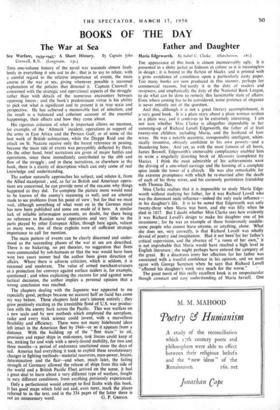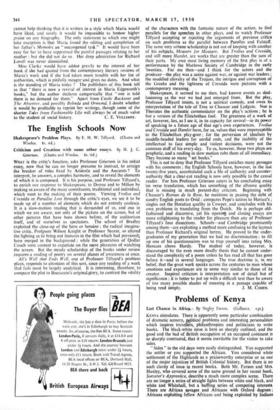Father and Daughter
Maria Edgeworth. By Isabel C. Clarke. (Hutchinson. 18s.)
THE appearance of this book is almost inconceivably ugly. It is presented in a shiny jacket as hideous in colour as it is meaningless in design ; it is bound in the flattest of blacks, and is printed with a grim avoidance of comeliness upon a particularly nasty paper. Too many books are now produced in this manner, perhaps for commercial reasons, but surely it is the duty of readers and reviewers, and emphatically the duty of the National Book League, to do what can be done to remedy this lamentable state of affairs. Even where costing has to be considered, some pretence of elegance is never entirely out of the question.
And this, although it is not a great literary accomplishment, is a very good book. It is a plain story about a plain woman written in a plain way, and it contrives to be extremely interesting. I am not sure whether Miss Clarke is altogether dependable in her summing-up of Richard Lovell Edgeworth, the father of at least twenty-one children, including Maria, and the husband of four wives. He was a notable eccentric, irresponsibly intelligent, whim- sically inventive, obtusely confident in his own powers—and a thundering bore. And yet, as with the most famous of all bores, James Boswell, Edgeworth's immovable complacency enabled him to write a singularly diverting book of Memoirs (completed by Maria). I think the most admirable of his achievements were the driving of a one-wheel carriage and the hoisting of a complete spire inside the tower of a church. He was also remarkable for the extreme promptness with which he re-married after the death of each of his three wives, and his curiously portentous friendship with Thomas Day.
Miss Clarke realises that it is impossible to study Maria Edge- worth without studying her father, for it was Richard Lovell who was the dominant male influence—indeed the only male influence— in his daughter's life. It is to be noted that Edgeworth was only twenty-three when Maria was born, and she was fifty when he died in 1817. But I doubt whether Miss Clarke sees how evidently it was Richard Lovell's design to make his daughter one of his inventions ; for he was an example of those boisterously meddle- some people who cannot leave anyone, or anything, alone. What she does see, very correctly, is that Richard Lovell was wholly devoid of poetry and imagination. Had it not been.for her father's critical supervision, and the absence of " a room of her own," it is not improbable that Maria would have reached a high level in English literature ; she might perhaps have entered the category of the great. By a disastrous irony her affection for her father was associated with a trustful confidence in his opinion, and we must agree with George Sampson when he says that Richard Lovell " affected his daughter's work very much for the worse."
The great merit of this really excellent book is an unspectacular though constant and easy understanding of Maria herself. One
cannot help thinking that it is written in a style which Maria would have liked, and surely it would be impossible to bestow higher praise on any biography. The only statement to which one might take exception is that Maria found the editing and completion of her father's Memoirs an " uncongenial task." It would have been easy for her to have suppressed the painful passages relating to her mother ; but she did not do so. Her deep admiration for Richard Lovell was never diminished.
Miss Clarke would have added greatly to the interest of her book if she had quoted from the contemporary literary reviews of Maria's work and if she had taken more trouble with her list of authorities, which is pitifully meagre'and gives no dates. And what is the standing of Maria today ? The publishers of this book tell us that " there is now a revival of interest in Maria Edgeworth's books," but the author declares categorically that " one is told there is no demand for them." Apart from Castle Rackrent and The Absentee, and possibly Belinda and Ormond, I doubt whether it would be profitable to reprint her writings, though some of the shorter Tales from Fashionable Life will always be of much value



































 Previous page
Previous page